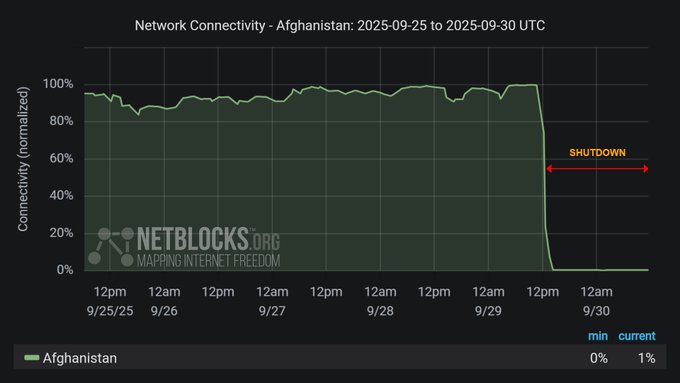Afghanistan completely shuts down the internet – and not even VPNs can help
Taliban authorities cut internet connections to "prevent immorality"

Sign up for breaking news, reviews, opinion, top tech deals, and more.
You are now subscribed
Your newsletter sign-up was successful
- Beginning on September 29, 2025, Afghanistan has shut down the internet completely
- Authorities justified the order as a way to "prevent immorality," but experts believe it comes to silence dissent and restrict communications
- VPNs cannot bypass these restrictions, with satellite internet and foreign SIM cards being the only viable options
Afghans are currently living in digital darkness as Taliban authorities cut citizens off from the rest of the world in a bid to "prevent immorality."
Internet watchdog NetBlocks began tracking a deterioration of internet connectivity levels since early September. On September 25, experts recorded a pattern of curfew-style internet shutdowns across some regions of the country. Everything collapsed on Monday (September 29) when the country fell into a total communication blackout as both internet and telephone services stopped working.
While the best VPN services can generally help people to bypass government-imposed restrictions and get back online, they need a live internet connection to work. This makes Afghanistan's internet shutdown even more disruptive for citizens.
According to #KeepItOn Global Campaign Manager at Access Now, Felicia Anthonio, the Taliban's move comes rather as an attempt to tighten their control over information flow, silence dissent, and shield human rights abuses from public scrutiny.
"With so many restrictions already in place, this shutdown takes away the last remaining lifelines connecting the people of Afghanistan to the outside world," Anthonio told TechRadar.
The toll of Afghanistan's internet shutdown

As NetBlocks and Cloudflare Radar’s measurements show, all web and DNS traffic dropped to zero after the cutoff at a national level. IP address announcements, a system that provides internet services by linking groups of servers, also fell by two-thirds within the first twenty minutes of the blackout.
Beyond these technicalities, in practical terms, this means that most citizens are unable to get online.
Mix the internet shutdown with the ongoing telecoms blackout, and you have the perfect recipe to prevent all Aghans from communicating with anyone – both in and out of the country.
"The little information emerging from Afghanistan shows that the internet blackout is having a profound impact on every aspect of people’s rights and lives," Anthonio confirmed to TechRadar.
Fear and panic are fueling concerns among concerned citizens who cannot reach out to their loved ones. From education, health, and employment to travel and e-commerce, people also struggle to access essential services.
Internet access is anything but a luxury.
"For millions in Afghanistan, it is a lifeline," Anthonio told TechRadar. "For women, girls, journalists, and marginalized communities, already pushed to the margins by Taliban policies, connectivity is often the only way to participate in society."
Beyond VPNs
Every time governments enforce online restrictions, people turn to circumventing tools like virtual private network (VPN) apps to spoof their IP address and grant access to blocked content.
This time, however, it's the whole internet that is in the dark. Hence, VPNs cannot do the trick, leaving Afghans with very limited resources to keep the information flow going.
According to Proton VPN's General Manager, David Peterson, the last time that such a nationwide internet blackout occurred was in mid-June in Iran, lasting for three days.
During most internet restriction events, Proton VPN users are still able to tunnel through to the outside world. But not when the internet is totally unplugged. The last time we saw a total and deliberate nationwide internet blackout like this was Iran for 3 days in mid-June. https://t.co/Qdt5pz3MQFSeptember 29, 2025
Anthonio explains that satellite connectivity offered by Starlink and similar services is becoming a common alternative for people and communities facing internet blackouts.
There's just one problem – pricing and availability are still a barrier for most people experiencing the aftermath of an internet shutdown.
This has then brought people to use foreign SIM cards or satellite phones instead. Yet, this method comes with a cost for Afghans, and it's not about money.
"The Taliban has shown willingness to retaliate against those who defy their orders," explains Anthonio.
What's needed right now, according to Anthonio, is for the international community to step in support of the rights group demanding an end to the violation of people’s rights in Afghanistan.
While the Afghanistan situation is particularly dire, the Taliban is far from being the only government disrupting the internet to push forward a political agenda.
Commenting on this point, Anthonio said: "Sadly, this move follows a familiar pattern in the authoritarian playbook, where authorities are increasingly normalizing the use of internet shutdowns to deny people their human rights."
You might also like

Chiara is a multimedia journalist committed to covering stories to help promote the rights and denounce the abuses of the digital side of life – wherever cybersecurity, markets, and politics tangle up. She believes an open, uncensored, and private internet is a basic human need and wants to use her knowledge of VPNs to help readers take back control. She writes news, interviews, and analysis on data privacy, online censorship, digital rights, tech policies, and security software, with a special focus on VPNs, for TechRadar and TechRadar Pro. Got a story, tip-off, or something tech-interesting to say? Reach out to chiara.castro@futurenet.com
You must confirm your public display name before commenting
Please logout and then login again, you will then be prompted to enter your display name.